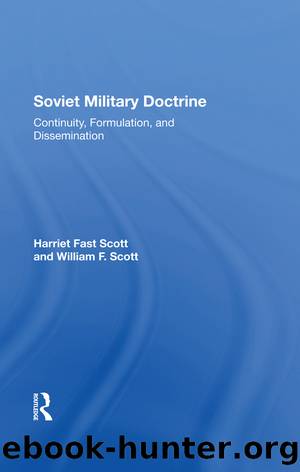Soviet Military Doctrine by Harriet Fast Scott William F. Scott

Author:Harriet Fast Scott, William F. Scott [Harriet Fast Scott, William F. Scott]
Language: eng
Format: epub
ISBN: 9780367303709
Google: 3fu-zQEACAAJ
Publisher: Taylor & Francis Group
Published: 2020-12-07T03:02:36+00:00
Nuclear Weapons and the Laws of War
The Party-military leadership began to give serious consideration to the laws of war in the late 1950s and early 1960s, at the very time they were making a massive effort to produce and to deploy nuclear weapons. It may have been the attention given to developing concepts for the use of nuclear forces that led to the attempt to develop laws of war and laws of armed conflict.
An initial view was that if nuclear weapons were used in a war, the simultaneous use of large numbers of troops would not be required. However, with respect to a war as a whole, multimillion-man armies still would be needed to replace the tremendous personnel losses. Even more important would be the troop requirements of the victor in the postwar period, for âthe winning side will have to occupy great territory. This cannot be avoided because the enemy cannot be considered fully beaten until the time when his territory is occupied and he is deprived of the possibility of continuing the conflict.â60
The assertion that multimillion-man armies are needed in order to occupy the enemyâs territory following a nuclear war is seldom found in Soviet writings. Generally, the multimillion-man armies are justified as being needed to replace the heavy casualties that would result from a nuclear exchange. Would the Soviet Union have contingency plans for the possible occupation of the United States in the event of a nuclear war? It appears that this possibility is considered in conjunction with the study of the laws of war.
Soviet military theorists in the 1960s were most concerned with the significance of the laws of war for âforecastingâ the nature of armed combat in a world nuclear-rocket war. A war between the two world social systems, communism and capitalism, would involve decisive political goals.61 In such a war, they reasoned, all means of combat, including nuclear weapons, would be used. Such weapons would produce completely new qualitative changes in the nature of armed conflict and in the methods and forces by which it is carried out. Military operations would become extraordinarily intensive, fast moving and of brief duration. The development of nuclear weapons brought about a new law of armed conflict: the course and outcome of a battle would be decided by the blows of nuclear weapons. Final victory would be achieved by the combined efforts of all services of the Armed Forces, with the Strategic Rocket Forces playing the decisive role.62
Still, in a nuclear-rocket war, the law of the dependence of the course and outcome of engagements, battles, and operations on the relative combat power of the opposing sides would continue to operate. Success during battle in nuclear war, as in any other type of conflict, requires superiority of forces over the enemy. Each side would attempt to surpass the other in the power of nuclear strikes. At the same time, because of the decisive power of nuclear weapons, each side battling âfor the achievement of victory should first of all seek out and destroy the enemyâs means of nuclear attackâ¦.
Download
This site does not store any files on its server. We only index and link to content provided by other sites. Please contact the content providers to delete copyright contents if any and email us, we'll remove relevant links or contents immediately.
| Africa | Americas |
| Arctic & Antarctica | Asia |
| Australia & Oceania | Europe |
| Middle East | Russia |
| United States | World |
| Ancient Civilizations | Military |
| Historical Study & Educational Resources |
Red Famine: Stalin's War on Ukraine by Anne Applebaum(2470)
Chernobyl by Serhii Plokhy(2131)
Midnight in Chernobyl by Adam Higginbotham(2081)
The House of Government by Slezkine Yuri(1847)
Midnight in Chernobyl: The Untold Story of the World's Greatest Nuclear Disaster by Adam Higginbotham(1776)
Red Shambhala by Andrei Znamenski(1752)
The Gulag Archipelago (Vintage Classics) by Aleksandr Solzhenitsyn(1730)
From Cold War to Hot Peace by Michael McFaul(1714)
All the Kremlin's Men by Mikhail Zygar(1703)
Putin's Labyrinth(1662)
Red Notice by Bill Browder(1596)
The Future Is History by Masha Gessen(1593)
From Russia with Lunch by David Smiedt(1553)
A People's Tragedy by Orlando Figes(1545)
The Romanovs by Simon Sebag Montefiore(1493)
How to Tame a Fox (and Build a Dog): Visionary Scientists and a Siberian Tale of Jump-Started Evolution by Lee Alan Dugatkin & Lyudmila Trut(1469)
Putin's Labyrinth: Spies, Murder, and the Dark Heart of the New Russia(1457)
The Lost Spy by Andrew Meier(1399)
Art and Revolution by John Berger(1391)
